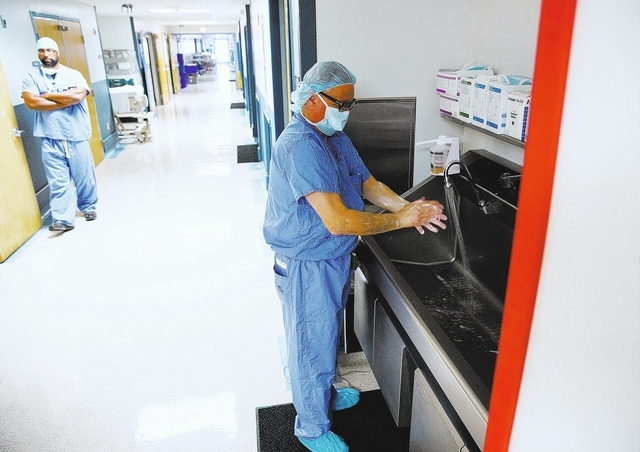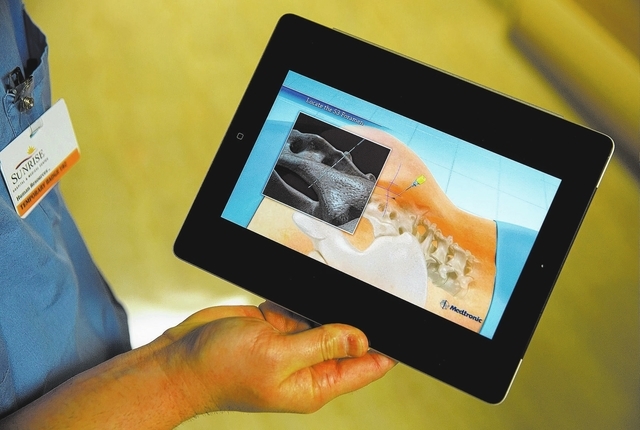Therapy treatment provides relief to those who suffer from incontinence
The 64-year-old woman sits in her plush Turnberry Towers condominium just off the Strip and talks about what it was like to be a prisoner in her home.
Frequently, she fights back tears and clears her throat so she’s able to continue.
“It’s not easy talking about this,” she says.
For almost a decade she suffered from bowel, or fecal incontinence, the inability to control bowel movements. The need to have a bowel movement would come on so quickly that she couldn’t get to the bathroom in time.
Or she’d have no sensation of a bowel movement at all until it happened.
Nearly 18 million American adults, about one in 12, have fecal incontinence, according to the National Digestive Diseases Information Clearinghouse. Researchers say the number could be higher because people who have it are often embarrassed and reluctant to talk about it to anyone, including their primary care doctors.
Although people of any age can have the problem, it’s more common among older people, especially women, many of whom suffered difficult childbirths that injured their pelvic floor — muscles, tissues and ligaments supporting the uterus, vagina, bladder and rectum.
Just remembering the smell of “when I had accidents” before she underwent surgery to implant the InterStim Therapy System that corrected her problem almost makes the woman in the Turnberry Towers gag.
Adult diapers, ruined clothes, shower after shower during the day and night in an effort to stay clean — it’s been three years since her life revolved around a malfunctioning bodily function, but her daily embarrassment from that time in her life has clearly been etched in her psyche.
“You don’t have to use my name do you?” she pleads.
There’s one reason, and one reason only, she says, that she decided to talk about a condition that would not allow her to visit friends or work and limited her grocery shopping to late night trips when few people were around:
“I want people to know that there’s hope, that they may be able to have done what I have and start living again.”
What she did was undergo a 45-minute procedure performed at Sunrise Hospital and Medical Center by Dr. Joseph Thornton, a colon and rectal surgeon who implanted the InterStim’s small neurostimulator disc in her right upper buttock, creating a pouch much like a heart surgeon does when implanting a pacemaker in a patient’s chest. Through a tiny wire, the device delivers an electrical pulse to the sacral nerve, which controls bowel function.
By enhancing rectal sensation via the sacral nerve roots as they emerge from the spinal canal, the surgically implanted device increases the communication of the nerve to the brain so an individual has a better ability to sense when he or she has to go to the bathroom. A hand-held instrument allows the doctor or patient to control the electrical pulse delivered by the neurostimulator.
The device, identical to one approved in 1997 by the federal government for urinary incontinence, was approved by the Food and Drug Administration in 2011 for fecal incontinence.
“It’s given me new life,” Thornton’s patient says. “I don’t have a problem any more. Now I’m working as a private assistant, flying all over the place checking on properties. Until this, I had basically given up that anything could be done.”
Thornton, an associate professor of surgery at the University of Nevada School of Medicine, was selected three years ago by Medtronic, the maker of InterStim, to introduce the device to patients in the Las Vegas Valley.
The rollout has been slow.
“To be honest with you, I didn’t think it was going to be all that successful,” Thornton says of the device. “But now we’ve done about 15 of them and they’ve all been 1,000 percent successful. People going from complete fecal incontinence to total continence. It’s hard to believe sometimes, but it’s happening. Nobody’s completely sure how it works, only that it does. Urologists tell me they’ve long known it was more effective for fecal incontinence than urinary incontinence. It’s a shame it wasn’t put on the market sooner for this problem. Unfortunately, not enough doctors know we’re now doing it in Las Vegas and referring patients for it.”
Randomized studies of patients who have had InterStim therapy for fecal incontinence show that 41 percent have regained complete continence following the procedures. Eighty-three percent achieve at least a half-reduction in episodes of incontinence per week.
A study before FDA approval of the device found that although most patients improved, 22 out of 120 did not improve, or their bowel accidents became worse. Fourteen out 120 patients had the device removed. The study said that 22 patients needed another surgery to fix or replace the device.
Medtronic reports that the battery strength of the device will deplete over time, making it incapable of powering the neurostimulator. When this happens, the neurostimulator will need to be surgically replaced. How long it will last depends on how it is used, according to the manufacturer.
Thornton says it will last “several years.”
If you experience episodes of bowel incontinence at least once a week, Thornton says you should mention it to your doctor. It’s a chronic condition that can worsen over time.
Thornton, who recently went to the Cleveland Clinic facility in Florida for more training, says it is crucial that the electrical lead implanted on the sacral nerve be in the precise position for optimum success. Two of his associates at the medical school, he says, have also been trained to do the surgery.
“It’s like threading a needle to put it in the exact spot,” Thornton says. “There’s a break in the chain and this is like putting another link in the chain. You use an X-ray to do that.”
According to Thornton, as many as 100,000 people in the Las Vegas Valley could benefit from the outpatient procedure that is covered by practically all insurance carriers. “We’ve never had a failure,” he says, “but that doesn’t guarantee we won’t have one.”
Thornton points out that those who may benefit from long-term implantation are first identified during a two-week trial period. Should their bowel accidents decline by at least half in a week, the patient is then eligible for the procedure. According to the surgeon, those who have had radiation in the sacral nerve area are excluded from the procedure
People should keep in mind, Thornton says, that the procedure is not thought of as the first course of treatment for fecal incontinence. Diet and lifestyle modifications as well as medications should be used first.
Some people have opted for a colostomy to deal with fecal incontinence, Thornton says. A surgical procedure that brings one end of the large intestine out through an opening made in the abdominal wall, stools moving through the intestine drain through the opening into a bag attached to the abdomen.
It is a procedure that, although it can be effective, is one that the surgeon says most people shy away from because the bag is outside the body, has a reputation for smelling bad and is costly to maintain.
“There have been great improvements in colostomies but the perception is still there,” he says.
What that often results in is people suffering in silence with fecal incontinence, Thorton says. “I had one grandmother tell me she hasn’t seen her grandkids in 12 years because of the problem,” he says. “I’ve also had people say that it’s had devastating effect on their marriages.”
The woman in Turnberry Towers prays the therapy system will be as successful for other people as it has been for her.
“I totally forget that I even have the device on,” she says. “I feel like I wasted a big part of my life. Now I travel all the time. Thank God I had a doctor who referred me to the right doctor. I used to be someone who had to sit in the bathroom 100 times a day. Now I can be what I am — a social person who loves people, not somebody who felt like she had to hide.”
Contact reporter Paul Harasim at pharasim@reviewjournal.com or 702-387-2908.































